【美联英语】雅思大作文范文:垃圾问题
- 格式:doc
- 大小:73.50 KB
- 文档页数:6
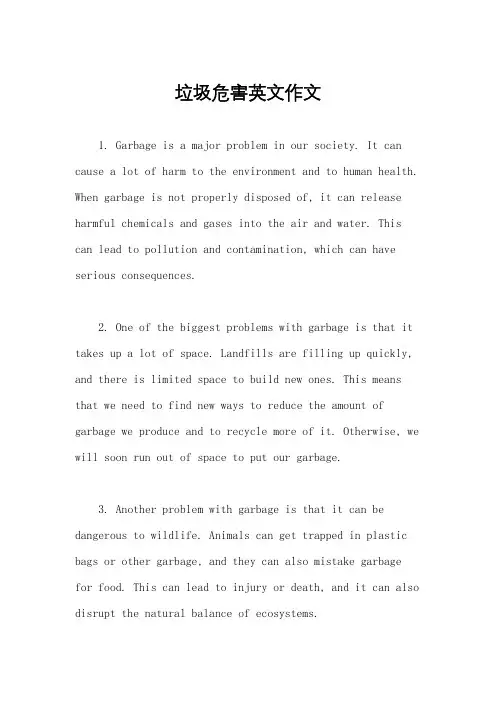
垃圾危害英文作文1. Garbage is a major problem in our society. It can cause a lot of harm to the environment and to human health. When garbage is not properly disposed of, it can release harmful chemicals and gases into the air and water. This can lead to pollution and contamination, which can have serious consequences.2. One of the biggest problems with garbage is that it takes up a lot of space. Landfills are filling up quickly, and there is limited space to build new ones. This means that we need to find new ways to reduce the amount of garbage we produce and to recycle more of it. Otherwise, we will soon run out of space to put our garbage.3. Another problem with garbage is that it can be dangerous to wildlife. Animals can get trapped in plastic bags or other garbage, and they can also mistake garbagefor food. This can lead to injury or death, and it can also disrupt the natural balance of ecosystems.4. Garbage can also be a health hazard for humans. When garbage is not properly disposed of, it can attract pests like rats and cockroaches. These pests can spread disease and cause health problems for people who come into contact with them. Garbage can also release harmful chemicals and gases into the air, which can cause respiratory problems and other health issues.5. Ultimately, the best way to deal with garbage is to reduce the amount we produce in the first place. We can do this by using fewer disposable products, buying products with less packaging, and composting food waste. We can also recycle more of our garbage, which will help to conserve resources and reduce pollution. By taking these steps, we can protect the environment and improve our own health and well-being.。
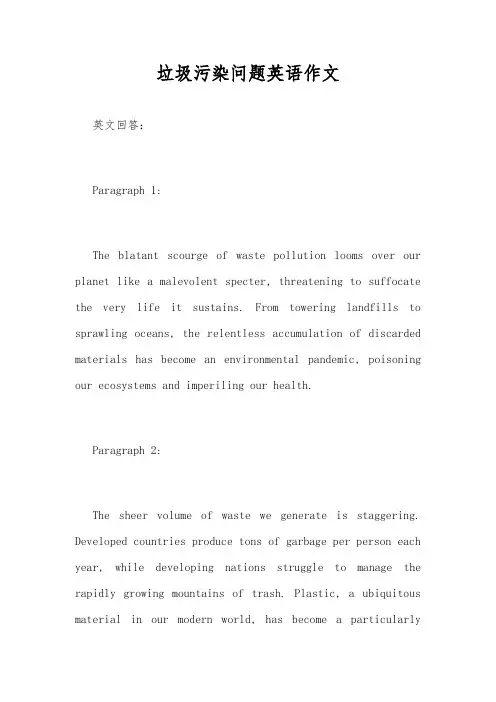
垃圾污染问题英语作文英文回答:Paragraph 1:The blatant scourge of waste pollution looms over our planet like a malevolent specter, threatening to suffocate the very life it sustains. From towering landfills to sprawling oceans, the relentless accumulation of discarded materials has become an environmental pandemic, poisoning our ecosystems and imperiling our health.Paragraph 2:The sheer volume of waste we generate is staggering. Developed countries produce tons of garbage per person each year, while developing nations struggle to manage the rapidly growing mountains of trash. Plastic, a ubiquitous material in our modern world, has become a particularlypernicious pollutant, choking our waterways and entangling marine life.Paragraph 3:The consequences of waste pollution are far-reaching and severe. In landfills, decomposing organic matter releases methane, a potent greenhouse gas. Open burning of waste releases toxic chemicals into the atmosphere, harming human health and contributing to respiratory conditions. Eutrophication, caused by excessive nutrient runoff from landfills and sewage plants, creates harmful algal blooms in water bodies, which can kill fish and render water unsafe for drinking.Paragraph 4:The emotional toll of waste pollution is often overlooked. The sight of garbage-strewn streets, overflowing landfills, and plastic-laden oceans can evokefeelings of despair and hopelessness. It can also damage our sense of place and community, as our surroundings become increasingly degraded.Paragraph 5:Addressing the waste pollution crisis requires a multifaceted approach. We must reduce the amount of waste we produce, improve waste management systems, and promote recycling and composting. Innovations in waste reduction technologies, such as biodegradable materials and anaerobic digestion, hold promise for diverting waste from landfills.Paragraph 6:Individual actions also play a crucial role. By making conscious choices about the products we buy, reducing packaging waste, and composting organic materials, we can contribute to the reduction of waste pollution. Education and awareness campaigns are essential for fosteringbehavior change and empowering communities to take ownership of waste management.Paragraph 7:The battle against waste pollution is an urgent one. It demands our collective willpower, creativity, and commitment. By working together, we can create a more sustainable future where waste is minimized, resources are conserved, and the beauty of our planet is preserved for generations to come.中文回答:段落 1:垃圾污染问题如同一个凶恶的幽灵笼罩着我们的地球,它威胁着维持生命的星球。
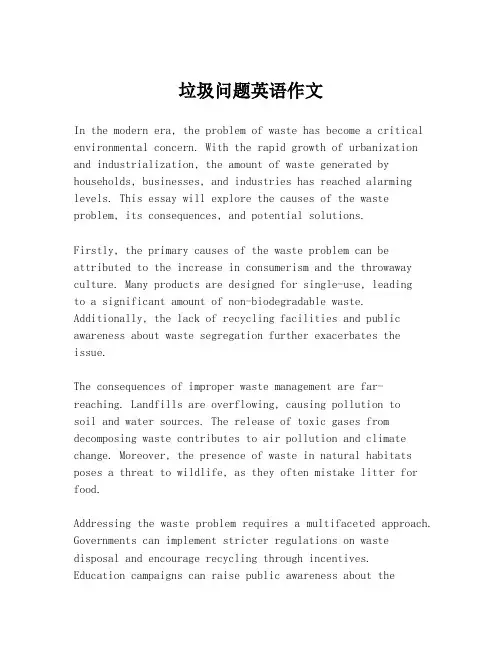
垃圾问题英语作文In the modern era, the problem of waste has become a critical environmental concern. With the rapid growth of urbanization and industrialization, the amount of waste generated by households, businesses, and industries has reached alarming levels. This essay will explore the causes of the waste problem, its consequences, and potential solutions.Firstly, the primary causes of the waste problem can be attributed to the increase in consumerism and the throwaway culture. Many products are designed for single-use, leadingto a significant amount of non-biodegradable waste. Additionally, the lack of recycling facilities and public awareness about waste segregation further exacerbates the issue.The consequences of improper waste management are far-reaching. Landfills are overflowing, causing pollution tosoil and water sources. The release of toxic gases from decomposing waste contributes to air pollution and climate change. Moreover, the presence of waste in natural habitats poses a threat to wildlife, as they often mistake litter for food.Addressing the waste problem requires a multifaceted approach. Governments can implement stricter regulations on waste disposal and encourage recycling through incentives.Education campaigns can raise public awareness about theimportance of reducing waste and the benefits of recycling. Furthermore, businesses can play a role by adopting sustainable practices, such as using eco-friendly packaging and promoting products that are durable and reusable.In conclusion, the issue of waste management is a complex challenge that demands immediate attention. It is the collective responsibility of individuals, businesses, and governments to work together to reduce waste, recycle more effectively, and protect our environment for future generations. By taking action now, we can mitigate the negative impacts of waste on our planet and ensure a cleaner, healthier world for all.。
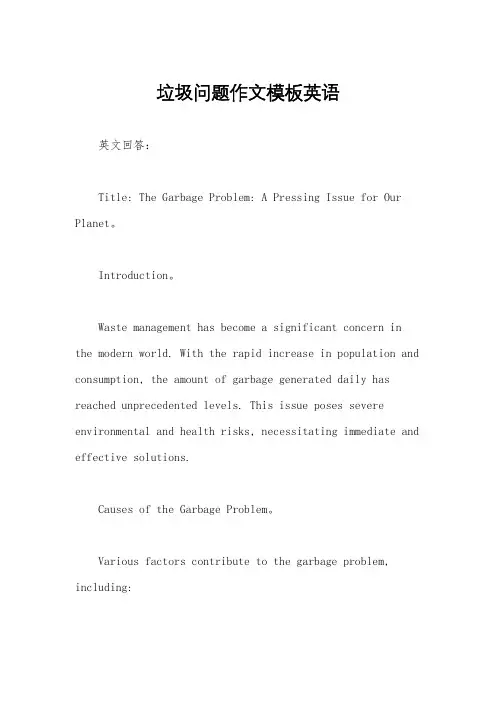
垃圾问题作文模板英语英文回答:Title: The Garbage Problem: A Pressing Issue for Our Planet。
Introduction。
Waste management has become a significant concern in the modern world. With the rapid increase in population and consumption, the amount of garbage generated daily has reached unprecedented levels. This issue poses severe environmental and health risks, necessitating immediate and effective solutions.Causes of the Garbage Problem。
Various factors contribute to the garbage problem, including:Population growth: As the global population continues to grow, so does the demand for goods and services, leading to increased waste generation.Increased consumption: The rise in consumerism and disposable products has resulted in a surge in the amount of waste produced.Urbanization: Urban areas generate significantly more garbage than rural areas due to higher population densities and consumption patterns.Inadequate waste management systems: In many developing countries, waste management infrastructure is insufficient or non-existent, leading to illegal dumping and open burning.Environmental Impacts。
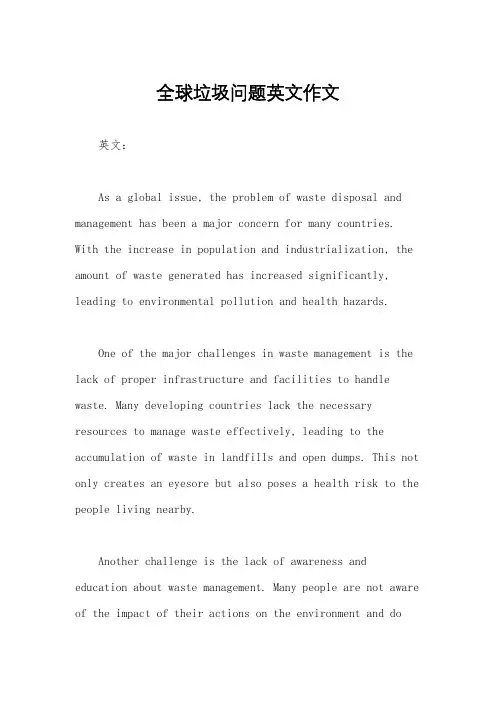
全球垃圾问题英文作文英文:As a global issue, the problem of waste disposal and management has been a major concern for many countries. With the increase in population and industrialization, the amount of waste generated has increased significantly, leading to environmental pollution and health hazards.One of the major challenges in waste management is the lack of proper infrastructure and facilities to handle waste. Many developing countries lack the necessary resources to manage waste effectively, leading to the accumulation of waste in landfills and open dumps. This not only creates an eyesore but also poses a health risk to the people living nearby.Another challenge is the lack of awareness and education about waste management. Many people are not aware of the impact of their actions on the environment and donot know how to properly dispose of waste. This leads to improper disposal of waste, which can cause environmental pollution and health hazards.To address these challenges, there needs to be a concerted effort by governments, businesses, andindividuals to manage waste effectively. Governments should invest in infrastructure and facilities to handle waste, while businesses should adopt sustainable practices and reduce waste generation. Individuals can also play a role by practicing proper waste disposal and reducing waste generation through recycling and composting.In conclusion, the global waste problem is a complex issue that requires a multi-faceted approach to address. By working together, we can create a cleaner and healthier environment for ourselves and future generations.中文:作为全球性的问题,垃圾处理和管理问题已经成为许多国家的主要关注点。
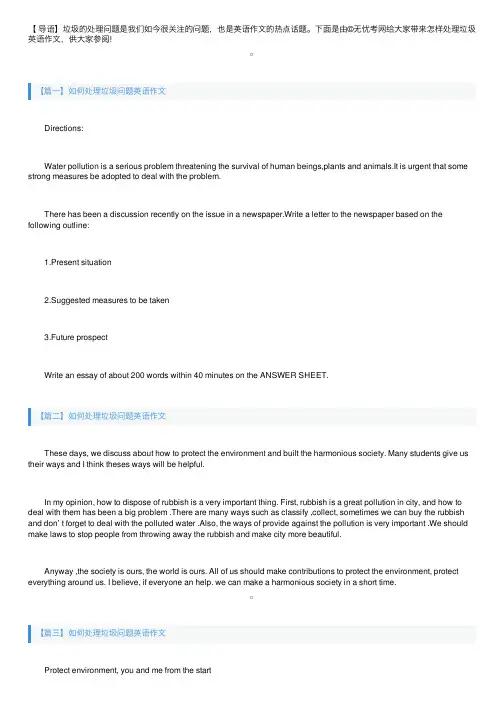
【导语】垃圾的处理问题是我们如今很关注的问题,也是英语作⽂的热点话题。
下⾯是由©⽆忧考⽹给⼤家带来怎样处理垃圾英语作⽂,供⼤家参阅!【篇⼀】如何处理垃圾问题英语作⽂ Directions: Water pollution is a serious problem threatening the survival of human beings,plants and animals.It is urgent that some strong measures be adopted to deal with the problem. There has been a discussion recently on the issue in a newspaper.Write a letter to the newspaper based on the following outline: 1.Present situation 2.Suggested measures to be taken 3.Future prospect Write an essay of about 200 words within 40 minutes on the ANSWER SHEET.【篇⼆】如何处理垃圾问题英语作⽂ These days, we discuss about how to protect the environment and built the harmonious society. Many students give us their ways and I think theses ways will be helpful. In my opinion, how to dispose of rubbish is a very important thing. First, rubbish is a great pollution in city, and how to deal with them has been a big problem .There are many ways such as classify ,collect, sometimes we can buy the rubbish and don’ t forget to deal with the polluted water .Also, the ways of provide against the pollution is very important .We should make laws to stop people from throwing away the rubbish and make city more beautiful. Anyway ,the society is ours, the world is ours. All of us should make contributions to protect the environment, protect everything around us. I believe, if everyone an help. we can make a harmonious society in a short time.【篇三】如何处理垃圾问题英语作⽂ Protect environment, you and me from the start Garbage divides a lot of kinds such as: food bag, peel, wastepaper, white plastic bags, leaves, leftover residue, various bottles, etc.; The garbage can is divided into, recyclable and unrecyclable recyclable two, are: all kinds of bottles, glass, cardboard, unrecyclable are: food bag, peel, paper scraps, etc.. Dad said: "recyclable garbage, recycling use, unrecyclable garbage landfill or incineration, directly, it can reduce the waste of resources, but also protect environment. I hope you can take good care of our planet【篇四】如何处理垃圾问题英语作⽂ With the developement the society,the rubbish are getting more and more.It is harmful to the environment and health.So we must to take some measures to handle this serious problem.According to the report,thounds of tons rubbish were made in a city,and do you know how many cities in China,it will bring us a lot of problems. First,I think the goverement should build some factories to handle the rubbish,and we could divide the rubbish into different parts.Because some of them could be reused.Like iron and glasses. Secondly,as a person.We shoud not throw them everywhere.It is very simple to put the rubbish into the dustin. I believe with the help of the goverement and all the people,our Earth Mother will become more and more beautiful.Let us do it together.【篇五】如何处理垃圾问题英语作⽂ Society produces a lot of rubbish, such as leftover food, waste paper, plastic bottles and batteries every day. It has become a big headache in every city. How to solve this problem? I think rubbish classification is a good way of dealing with it. Firstly, rubbish classification can reduce the amount of rubbish and the rubbish pollution to the environment. What is more, it can recycle resources, which will do good to our environmental protection. Since rubbish classification has so many advantages, our government should take effective measures and immediate actions. Different dustbins should be placed in public places so that residents can leave their sorted rubbish in them.【篇六】如何处理垃圾问题英语作⽂ The Significance of Waste Sorting People are producing waste every day, which is a huge burden on the planet's habitat. Some waste is not degradable naturally, which will exist forever, but some waste can be recycled and reused again. Waste sorting can help divide the reusable waste from the rest. And there are two reasons for doing this. Firstly, the earth is limited in its natural resources, and many products are made from finite resources, which cannot be generated by nature in a short period of time. Simply dumping this kind of products is wasting resources. Secondly, some part of the waste is of value. To reuse and recycle this kind of waste is to save resources to a large extent, which also contributes to environmental protection. Sorting waste is a meaningful deed. If everyone can do it, small things can make a big positive impact on the environment.。
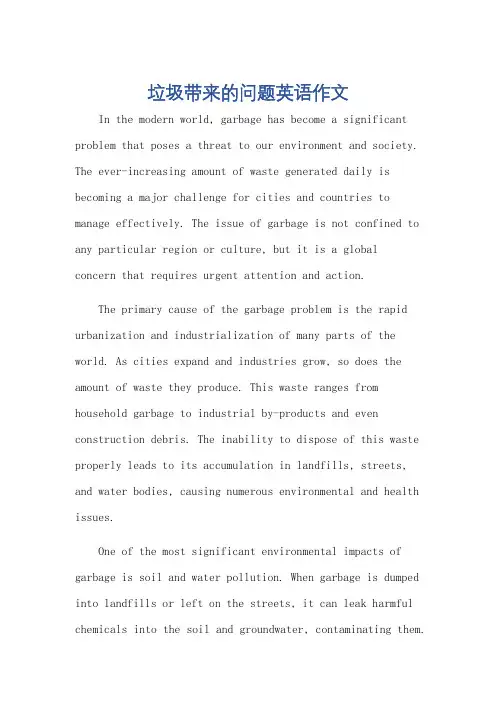
垃圾带来的问题英语作文In the modern world, garbage has become a significant problem that poses a threat to our environment and society. The ever-increasing amount of waste generated daily is becoming a major challenge for cities and countries to manage effectively. The issue of garbage is not confined to any particular region or culture, but it is a globalconcern that requires urgent attention and action.The primary cause of the garbage problem is the rapid urbanization and industrialization of many parts of the world. As cities expand and industries grow, so does the amount of waste they produce. This waste ranges from household garbage to industrial by-products and even construction debris. The inability to dispose of this waste properly leads to its accumulation in landfills, streets, and water bodies, causing numerous environmental and health issues.One of the most significant environmental impacts of garbage is soil and water pollution. When garbage is dumped into landfills or left on the streets, it can leak harmful chemicals into the soil and groundwater, contaminating them.This pollution can have devastating effects on agricultural land, affecting crop yields and the quality of food and water we consume.Garbage also poses a threat to wildlife and ecosystems. Animals can become entangled in plastic bags or other debris, leading to their death. In addition, garbage dumps can become breeding grounds for rats and other pests, which can spread diseases to humans and other animals. Furthermore, the incineration of garbage can release harmful gases into the air, contributing to air pollution and climate change.The social impact of garbage is also significant. The presence of garbage in neighborhoods and public spaces can affect the quality of life for residents, leading to a decrease in property values and a sense of dissatisfaction and disgust. Garbage can also create safety hazards, such as fires and explosions at landfills. The cost of garbage management can also be a burden on local governments and taxpayers.To address the garbage problem, a multifaceted approach is needed. Firstly, better waste management systems must beimplemented to ensure that garbage is collected, sorted,and disposed of properly. This includes the establishmentof recycling programs and the use of composting and incineration methods that minimize harmful emissions. Secondly, education and awareness-raising campaigns are crucial to encourage individuals and communities to reduce, reuse, and recycle their waste. Additionally, policies and regulations should be enforced to ensure that industriesand businesses are held accountable for their waste generation and disposal practices.In conclusion, the garbage problem is a pressing issue that requires urgent action and collaboration at all levels. By implementing effective waste management systems, promoting education and awareness, and enforcing policies and regulations, we can begin to address this global challenge and protect our environment and society from the harmful effects of garbage.**垃圾问题带来的挑战:全球视角**在现代社会,垃圾已经成为一个重大问题,对我们的环境和社会构成威胁。
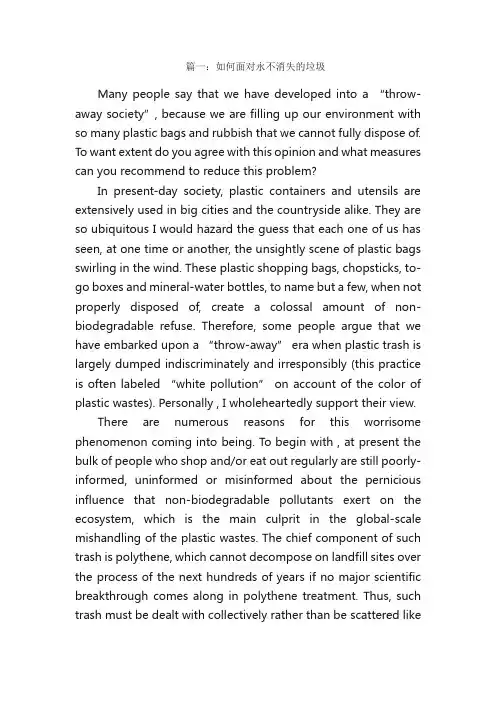
篇一:如何面对永不消失的垃圾Many people say that we have developed into a “throw-away society”, because we are filling up our environment with so many plastic bags and rubbish that we cannot fully dispose of. To want extent do you agree with this opinion and what measures can you recommend to reduce this problem?In present-day society, plastic containers and utensils are extensively used in big cities and the countryside alike. They are so ubiquitous I would hazard the guess that each one of us has seen, at one time or another, the unsightly scene of plastic bags swirling in the wind. These plastic shopping bags, chopsticks, to-go boxes and mineral-water bottles, to name but a few, when not properly disposed of, create a colossal amount of non-biodegradable refuse. Therefore, some people argue that we have embarked upon a “throw-away” era when plastic trash is largely dumped indiscriminately and irresponsibly (this practice is often labeled “white pollution” on account of the color of plastic wastes). Personally , I wholeheartedly support their view.There are numerous reasons for this worrisome phenomenon coming into being. To begin with , at present the bulk of people who shop and/or eat out regularly are still poorly-informed, uninformed or misinformed about the pernicious influence that non-biodegradable pollutants exert on the ecosystem, which is the main culprit in the global-scale mishandling of the plastic wastes. The chief component of such trash is polythene, which cannot decompose on landfill sites over the process of the next hundreds of years if no major scientific breakthrough comes along in polythene treatment. Thus, such trash must be dealt with collectively rather than be scattered liketumbleweeds. Secondly, the proliferation of plastic shopping bags and eating ware is largely fuelled by the surging, headlong consumerism. Plastic containers and utensils are lighter in weight, cheaper(often free of charge) in price and water-resistant in performance. These superior properties make them preferable to their paper and cloth c ounterparts in customers’ eyes; and as consumer satisfaction reigns supreme in contemporary society, compared with superb portability, affordability and utility, how to dispose of them is the last thing the customers are concerned about. Additionally, plastic bags, wrap and containers are also commercially feasible since they are cheaper to manufacture, ship and store. These mercenary considerations also have prompted the good old cloth or paper bags to be supplanted by plastic bags but over the phasing-out process, few stores and restaurants advocate or encourage the use of environmentally—benign disposal of plastic trash, hence the whole slew of non-biodegradable garbage. And environmental hazards ensue.Given the scale and severity of “white pollution”, w e must take immediate steps to address this scourge. In the first place, we must do our utmost to enhance people’s awareness of how persistent and devastating non-biodegradable trash can be to our environment and our posterity’s. Secondly, retail stores an d dining establishments should spare no effort in encouraging their customers to reuse plastic packing items. Furthermore, indiscriminate and irresponsible dumping of household garbage or personal junk should be outlawed by the legislature and heavy fines or even jail terms must be imposed on those compulsive litterbugs who fail to get their act together. Then , on the part of the biochemical researchers and technologists , scientific research must be launched here and now in pursuit of effectualways to convert non-biodegradable refuse to biodegradable refuse. Last but not least, the government must not shirk its obligations in mobilizing scientific resources and rallying popular support in the crusade against “white pollution”. Neither should it pay just lip service to relevant research and campaigns if no enough funding can be obtained otherwise. Additionally, I am convinced a customer tax levied by the government on the use of plastic bags will also help to curb this massive “white pollution”.The havoc non-biodegradable refuse can wreak on the ecosystem is beyond our imagination. It can eventually devastate soil, water and the aquatic and terrestrial biota. We must start combating this environmental catastrophe before the ecosystem irretrievably breaks down under the reign of the minute plastic debris.篇二:垃圾问题The roads are dotted with trash, the railways are littered with decaying garbage and our cities are disgraced by plastic bags. Lately, the worsening rubbish problem has aroused people’s wide concern. Some hold the belief that it is an overstatement to claim that people have formed a “throw away” society, and that they just discard the used items, which is necessary. Others, however, firmly contend that people do develop a habit of throwing things away. Personally, I firmly side with the latter.It is no doubt that our cities are on the way towards becoming a huge landfill. To begin with, people are in the habit of littering. Nowadays, people tend to discard old items like outdated furniture and worn-out appliance, which are actually recoverable. Furthermore, due to the inadequate facilities of garbage collection, people throw away their refuse everywhereat will. In addition, rubbish is in rapid increase. In the first place the quickening tempo of moder n lifestyle gives rise to people’s favor of disposable items for sake of convenience, which greatly adds the amount of rubbish. In the second place, the development of science and technology also contributes to it. It generates new product in a more frequent way, which makes the old ones cast aside as rubbish at a quicker pace. Consequently, our cities are decorated with trash..In view of the severity of the issue, we should adopt immediate measure to address it. First of all, the government should play a leading role. It ought to bring in strong anti-littering laws, backed by heavy penalties and effective enforcement, to tackle the littering behaviors. Also, officials should make good use of mass media to promote the public’s awareness of environmental protection, making sure that everyone will become a conscious environment protector. Additionally, scientists can develop efficient technologies to degrade and recycle the rubbish. Research findings reveal that 63% of the refuse nowadays are recycled. Finally, it is essential for schools to attach importance to environmental education, so that every child will become environmentally friendly and get rid of the littering habit.In conclusion, people’s littering habit is turning our communities into a rubbish holder. It is high time that we took joint effort to solve the rubbish problem. Otherwise, we will live with rubbish in the future.下载文档。
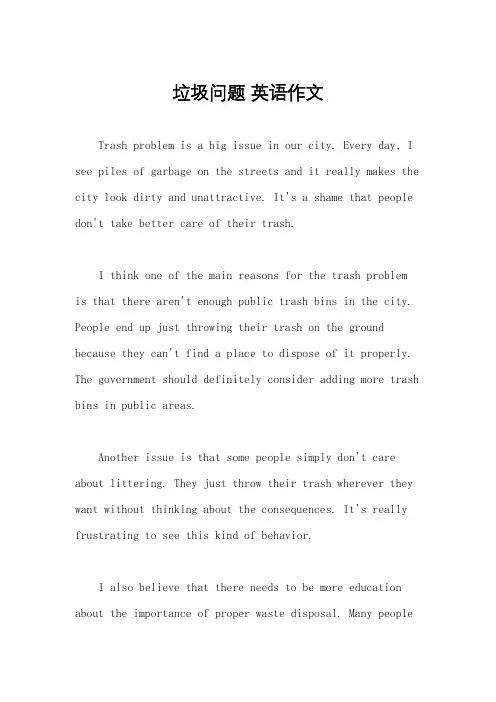
垃圾问题英语作文Trash problem is a big issue in our city. Every day, I see piles of garbage on the streets and it really makes the city look dirty and unattractive. It's a shame that people don't take better care of their trash.I think one of the main reasons for the trash problemis that there aren't enough public trash bins in the city. People end up just throwing their trash on the ground because they can't find a place to dispose of it properly. The government should definitely consider adding more trash bins in public areas.Another issue is that some people simply don't care about littering. They just throw their trash wherever they want without thinking about the consequences. It's really frustrating to see this kind of behavior.I also believe that there needs to be more education about the importance of proper waste disposal. Many peoplemay not be aware of the impact that their trash has on the environment. By raising awareness and educating the public, we can hopefully reduce the amount of trash on the streets.In addition, there should be stricter penalties for those who are caught littering. Right now, the consequences for littering are not severe enough to deter people from doing it. If there were harsher penalties in place, people might think twice before throwing their trash on the ground.。
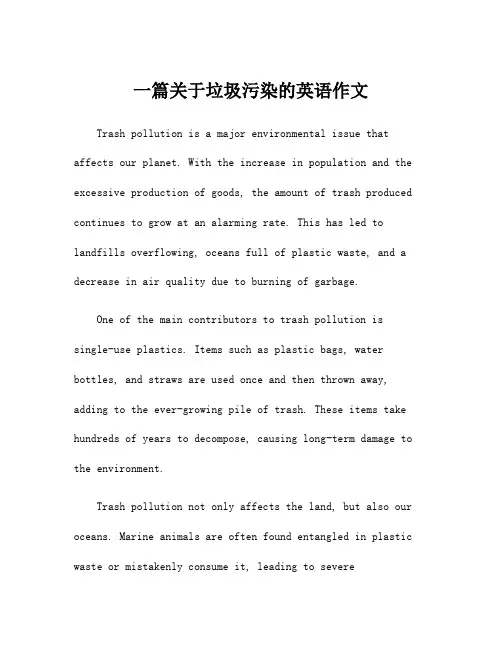
一篇关于垃圾污染的英语作文Trash pollution is a major environmental issue that affects our planet. With the increase in population and the excessive production of goods, the amount of trash produced continues to grow at an alarming rate. This has led to landfills overflowing, oceans full of plastic waste, and a decrease in air quality due to burning of garbage.One of the main contributors to trash pollution is single-use plastics. Items such as plastic bags, water bottles, and straws are used once and then thrown away, adding to the ever-growing pile of trash. These items take hundreds of years to decompose, causing long-term damage to the environment.Trash pollution not only affects the land, but also our oceans. Marine animals are often found entangled in plastic waste or mistakenly consume it, leading to severeconsequences for their health and well-being. Furthermore,the chemicals released by decomposing trash pollute the water, creating a toxic environment for aquatic life.In addition to the environmental impact, trash pollution also has negative effects on human health. The toxinsreleased by decomposing waste can contaminate the soil and water, leading to a variety of health problems. Moreover, the burning of trash releases harmful gases into the air, contributing to air pollution and respiratory issues.To combat trash pollution, it is important forindividuals to reduce, reuse, and recycle. This includesusing reusable bags, water bottles, and containers, as wellas properly sorting and disposing of trash. Educating the public about the impact of trash pollution and promoting sustainable practices is crucial in addressing this issue.Furthermore, efforts to innovate and develop eco-friendly alternatives to single-use plastics are essential. Companiescan play a significant role in reducing trash pollution by implementing sustainable packaging and production methods.Government regulations and policies are also necessary to effectively manage and reduce trash pollution. This mayinclude imposing fines for littering, incentivizing recycling, and investing in waste management infrastructure.In conclusion, trash pollution is a pressingenvironmental problem that requires immediate attention and collective action. By implementing sustainable practices, promoting eco-friendly alternatives, and enacting supportive policies, we can work towards a cleaner and healthier planet for future generations.。
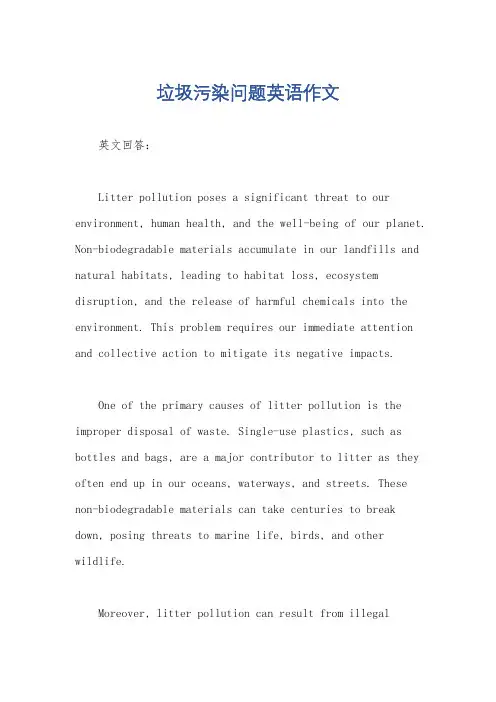
垃圾污染问题英语作文英文回答:Litter pollution poses a significant threat to our environment, human health, and the well-being of our planet. Non-biodegradable materials accumulate in our landfills and natural habitats, leading to habitat loss, ecosystem disruption, and the release of harmful chemicals into the environment. This problem requires our immediate attention and collective action to mitigate its negative impacts.One of the primary causes of litter pollution is the improper disposal of waste. Single-use plastics, such as bottles and bags, are a major contributor to litter as they often end up in our oceans, waterways, and streets. These non-biodegradable materials can take centuries to break down, posing threats to marine life, birds, and other wildlife.Moreover, litter pollution can result from illegaldumping, wind-blown waste, and inadequate waste management systems. The presence of litter in public spaces andnatural environments detracts from their aesthetic value and can create health hazards for nearby communities. The accumulation of litter can also block waterways, leading to flooding and water pollution.To effectively address litter pollution, we must adopt a comprehensive approach that involves waste reduction, proper disposal, and recycling. Reducing the production and consumption of single-use plastics is crucial. Reusable alternatives, such as reusable water bottles and shopping bags, can significantly reduce the amount of plastic waste generated. Additionally, encouraging proper waste disposal habits through public education campaigns and providing accessible recycling programs is essential.Furthermore, improving waste management systems isvital to prevent litter pollution at the source. This involves the development of efficient waste collection, processing, and disposal methods. Governments, businesses, and individuals share the responsibility of ensuring thatwaste is managed in a sustainable and environmentally friendly manner.By adopting these measures, we can significantly reduce litter pollution and protect the health of our planet. The benefits of a cleaner environment extend beyond aesthetics; they improve the quality of life for communities, support wildlife populations, and promote the sustainability of our natural resources. It is our collective responsibility toact now and create a future where litter pollution is athing of the past.中文回答:垃圾污染对我们的环境、人类健康和地球的福祉构成了严重威胁。
垃圾污染问题英语作文English: The issue of garbage pollution has become a major environmental concern worldwide. With the rapid increase in population and industrial development, the amount of waste generated has also escalated significantly, leading to severe pollution of land, water, and air. Improper disposal of garbage, such as throwing litter on the streets or dumping waste into rivers and oceans, not only contaminates the environment but also poses serious health risks to humans and wildlife. Plastic pollution, in particular, has become a critical problem as plastic waste does not decompose easily and is often ingested by marine animals, causing harm to ecosystems. Governments and communities need to take urgent action to address this issue by implementing recycling programs, promoting sustainable practices, and raising awareness about the importance of proper waste management to protect our planet for future generations.Translated content: 垃圾污染问题已经成为全球重要的环境问题。
垃圾带来的问题英语作文英文回答:Problems Associated with Litter.Litter, defined as the improper disposal of solid waste, poses significant challenges to both the environment and human health. The accumulation of litter disrupts ecosystems, contaminates water sources, and createsbreeding grounds for disease-carrying vectors.Environmental Impacts.Habitat degradation: Litter accumulates on land and in water, destroying habitats for wildlife. Animals can become entangled in plastic debris, ingest toxic substances, and lose nesting or breeding grounds.Water pollution: When litter enters waterways, it can leach harmful chemicals and nutrients into the water. Thispollution degrades water quality, threatens aquatic organisms, and compromises fishing and recreation.Aesthetic degradation: Litter spoils the beauty of natural landscapes and urban environments. Piles of trash and debris can detract from the visual appeal of parks, beaches, and other recreational areas.Human Health Impacts.Vector-borne diseases: Litter attracts pests and rodents, which can carry diseases such as hantavirus, leptospirosis, and Lyme disease.Direct contact: Broken glass, sharp metal objects, and other discarded items can cause injuries to people who walk or play in areas with litter.Psychological effects: Litter can create a sense of blight and disorder, which can have negative effects on mental health and well-being.Addressing the Problem of Litter.Combating litter requires a multifaceted approach involving education, enforcement, and infrastructure.Education: Public awareness campaigns can inform people about the negative impacts of litter and encourage responsible disposal of waste.Enforcement: Fines and other penalties can deterillegal littering and hold individuals accountable fortheir actions.Infrastructure: Adequate waste disposal facilities, such as recycling bins and composting systems, make it easier for people to dispose of waste properly.Conclusion.Litter is a significant environmental and public health problem that requires urgent attention. By addressing the causes and consequences of litter through education,enforcement, and infrastructure, we can create cleaner, healthier, and more aesthetically pleasing communities.中文回答:垃圾带来的问题。
垃圾问题英语作文英文回答:Garbage is a major issue in our world today. Itpollutes our environment, harms our health, and wastes valuable resources.One of the biggest problems with garbage is that it ends up in our oceans. Every year, millions of tons of plastic waste are dumped into the oceans, where it can harm marine life and pollute the water. Plastic can take hundreds of years to decompose, so it can accumulate in the oceans for a long time.Garbage can also pollute our air and soil. When garbage is burned, it releases harmful pollutants into the air. These pollutants can cause respiratory problems, heart disease, and cancer. Garbage can also leach harmful chemicals into the soil, which can contaminate our food and water supply.In addition to polluting our environment, garbage also wastes valuable resources. Every year, we throw away millions of tons of food, paper, and other materials that could be recycled or composted. This waste of resources is not only harmful to the environment, but it is also a waste of money.There are many things that we can do to reduce the amount of garbage that we produce. One of the most important things that we can do is to recycle. Recycling helps to conserve resources and reduce the amount of garbage that goes to landfills. We can also compost our food scraps and yard waste. Composting helps to turn organic waste into a nutrient-rich soil amendment.We can also reduce the amount of garbage that we produce by buying less stuff. When we buy less stuff, we create less waste. We can also choose to buy products that are made from recycled materials or that are recyclable.By taking these simple steps, we can all help to reducethe amount of garbage that we produce and protect ourplanet for future generations.中文回答:垃圾问题是我们当今世界面临的主要问题之一。
全球垃圾问题英文作文The global garbage problem is getting worse and worse. It seems like no matter where you go, there's always trash lying around. It's a real shame because it's not only an eyesore, but it's also harmful to the environment.I think one of the biggest issues is that people just don't care enough about where their trash ends up. They throw things away without a second thought, and it all adds up to create a huge problem. It's like they don't realize that their actions have consequences.There are so many different types of garbage out there, and each one has its own set of problems. Plastic, for example, takes hundreds of years to decompose, and in the meantime, it's clogging up our oceans and harming marine life. And then there's electronic waste, which is full of toxic chemicals that can leach into the soil and water.It's not just individuals who are to blame, though.Companies and governments also need to step up and take responsibility for the waste they produce. They should be investing in more sustainable packaging and waste management systems, and they should be enforcing stricter regulations to ensure that everyone is doing their part to reduce, reuse, and recycle.At the end of the day, we all need to do our part to tackle the global garbage problem. It's not going to be easy, but if we all work together, we can make a real difference. We need to start thinking more about the consequences of our actions and make more conscious choices about the things we buy and throw away. If we don't, the problem is only going to get worse.。
垃圾环境问题英语作文Garbage and environmental issues are becoming increasingly important topics in today's world. With the rapid growth of population and urbanization, the amount of waste we generate is also skyrocketing. This poses a serious threat to our environment and health.Let's talk about the impact of garbage on our environment. Mountains of trash are dumped in landfills, taking up valuable space and releasing harmful gases into the atmosphere. These gases contribute to global warming, causing climate change and affecting our planet's natural cycles. Additionally, plastic waste often ends up in our oceans, harming marine life and disrupting ecosystems.But it's not just about the environment. Garbage also poses a significant health risk. Improper waste disposal can lead to the spread of diseases and contamination of drinking water. Children are especially vulnerable to these risks, as they often play in areas where garbage is dumped.Fortunately, there are ways we can tackle this problem. Recycling is one effective solution. By separating and reusing materials like paper, glass, and plastic, we can reduce the amount of waste sent to landfills. Composting is another great option for organic waste, turning it intorich soil that can be used for gardening.Individual efforts are crucial, but government policies and regulations also play a vital role. Strict waste management laws and incentives for recycling can encourage people to adopt more sustainable practices. Additionally, educating the public about the importance of waste reduction and proper disposal is key to creating a culture of sustainability.In conclusion。
垃圾污染问题英语作文Rubbish Pollution。
Rubbish pollution is a major problem in today's society. With the rapid development of industry and the increasing population, the amount of rubbish produced has also increased dramatically. This has led to a range of environmental problems, including air and water pollution, and the destruction of natural habitats.One of the main causes of rubbish pollution is the excessive use of disposable products. From plastic bags to packaging materials, the use of disposable items has become a common practice in our daily lives. However, these items are often not disposed of properly, leading to them ending up in landfills or even worse, in the natural environment. This not only creates an eyesore, but also poses a serious threat to wildlife and the ecosystem.Another major cause of rubbish pollution is the lack ofproper waste management. In many developing countries,waste collection and disposal systems are inadequate, leading to rubbish being dumped in rivers, lakes, and other natural areas. This not only pollutes the water, but also poses a serious health risk to the local population.Furthermore, the production and disposal of rubbishalso contributes to greenhouse gas emissions, which in turn contributes to climate change. This creates a vicious cycle, as the effects of climate change can also lead to an increase in rubbish pollution. For example, extreme weather events such as hurricanes and floods can lead to the spread of rubbish over large areas, further exacerbating the problem.In order to tackle rubbish pollution, it is essential that we take action at both an individual and a collective level. At an individual level, we can reduce our use of disposable products and make an effort to recycle and reuse items wherever possible. We can also support initiatives to clean up rubbish from natural areas, and educate others about the importance of responsible waste disposal.At a collective level, governments and businesses need to take responsibility for implementing effective waste management systems. This includes investing in infrastructure for waste collection and disposal, as well as promoting sustainable practices such as recycling and composting. In addition, there needs to be greater regulation and enforcement of laws relating to waste disposal, in order to deter people from dumping rubbish in natural areas.In conclusion, rubbish pollution is a serious problem that poses a threat to the environment and human health. It is essential that we take action to address this issue, both at an individual and a collective level. By reducing our use of disposable products, improving waste management systems, and promoting sustainable practices, we can work towards a cleaner and healthier environment for future generations.。
小编给你一个美联英语官方试听课申请链接:/test/waijiao.aspx?tid=16-73675-0美联英语提供:雅思大作文范文:垃圾问题The roads are dotted with trash, the railways arelittered with decaying garbage and our cities aredisgraced by plastic bags. Lately, the worseningrubbish problem has aroused people’s wide concern.Some hold the belief that it is an overstatement toclaim that people have formed a “throw away”society, and that they just discard the used items,which is necessary. Others, however, firmly contendthat people do develop a habit of throwing thingsaway. Personally, I firmly side with the latter.It is no doubt that our cities are on the waytowards becoming a huge landfill. To begin with,people are in the habit of littering. Nowadays, people tend to discard old items like outdatedfurniture and worn-out appliance, which are actually recoverable. Furthermore, due to theinadequate facilities of garbage collection, people throw away their refuse everywhere at will.In addition, rubbish is in rapid increase. In the first place the quickening tempo of modernlifestyle gives rise to people’s favor of disposable items for sake of convenience, which greatlyadds the amount of rubbish. In the second place, the development of science and technologyalso contributes to it. It generates new product in a more frequent way, which makes the oldones cast aside as rubbish at a quicker pace. Consequently, our cities are decorated withtrash..In view of the severity of the issue, we should adopt immediate measure to address it.First of all, the government should play a leading role. It ought to bring in strong anti-litteringlaws, backed by heavy penalties and effective enforcement, to tackle the littering behaviors.Also, officials should make good use of mass media to promote the public’s awareness ofenvironmental protection, making sure that everyone will become a conscious environmentprotector. Additionally, scientists can develop efficient technologies to degrade and recycle therubbish. Research findings reveal that 63% of the refuse nowadays are recycled. Finally, it isessential for schools to attach importance to environmental education, so that every child willbecome environmentally friendly and get rid of the littering habit.In conclusion, people’s littering habit is turning our communities into a rubbish holder. Itis high time that we took joint effort to solve the rubbish problem. Otherwise, we will live withrubbish in the future.雅思大作文范文:世界用水量及消费量The graph and table illustrate respectivelyinformation about worldwide water use by sector over a span of 100 years from 1900 to 2000and water consumption in Brazil and Congo in 2000.As can be seen from the graph, global water use in three different sectors, namely,agriculture, industry and household clearly reveals two trends in the past century: slow increaseand fast increase. Comparing figures of the two sampled countries, we see that the differencesbetween Brazil and Congo were just huge.Firstly, 1900-1950 was a trend of increase. Agricultural water use gradually increased fromthe original 500,000 cubic meters to 1,000,000 cubic meters in 1950. That of industrial andhousehold use remained almost unchanged, only rising from almost zero in 1900 to 500 cubicmeters and 200 cubic meters respectively in 1950.Secondly, around 1950, agricultural water use entered a period of substantial increase,jumping from 1,000,000 cubic meters to 1,500,000 cubic meters in 1960. Afterwards, theincrease slowed down slightly, but then gained even stronger momentum and by 2000, it hadreached 3,000,000 cubic meters. After 1950, industrial water use also began to increasegreatly, arriving at 800,000 cubic meters in 1985. Then it continued to increase at an evenbigger rate and reached 1,200,000 cubic meters in 2000. Household water consumption startedto increase a little bit faster between 1950-1970, rising from 200 cubic meters to 400 cubicmeters, then the increase accelerated and quickly climbed to 300,000 cubic meters in 2000.Thirdly, from the table, we see the huge disparities between Brazil and Congo inpopulation, irrigated land area and the average water consumption per person. Thepopulation of Brazil was over 170 million more than that of Congo, its irrigated land area was265 times that of Congo, and its average water consumption per person was almost 45 timesthat of Congo.All in all, after having analyzed the graph and the table, we may safely draw the conclusionthat water is playing an increasingly important role in every aspect of our lives and that thewater consumption gap between the two sampled countries indicates that the more developed acountry is, the more water it will consume.雅思大作文范文:应否使用动物做实验Nowadays, experimental usage of animal hasbecome a widely concerned issue around the world.People hold diverse views towards it.Adversaries claim that it is an extremely crudebehavior. Animals, especially mammals, like dogs,cats, rabbits, rats, which are the major victims in theexperimentation, are usually human’s pets. Petowners are strongly against it for they firmly believethat animals suffer physically and mentally as we do.When equality is advocated in the modern world, it isinhuman to disrespect creatures that are nothuman beings.Furthermore, a number of experts pointed out that it would be at high stake of dependingon the results of animal experiment; since they differ from us in many ways. Take the bodystructure for example, we can’t imagine humans tryto jump from the height of nine storieswithout any protection because cats survive out of the same test.Those in favor of the idea about usage of animal declare that using animal is an advisablechoice. On one hand because their bodies are similar in function to ours. For instance, theycatch colds, suffer from stomachs and heart diseases, which more importantly influenced by dietand habits. The consequences of the test may not be applied to humans, although they arehighly connected to the human situations. On the other hand, those creatures yell and actabnormally when they feel uncomfortable, which is what exactly researchers expect. Inaddition, there is an easy-to-answer question: isn’t it crueler to test directly on people withlittle knowledge on the objects’effects? In a word, there is nothing better than animal thatresemble human the best for experiment.Personally, I am not a supporter of animal experiments, yet there is anything more suitablecan replace them, I accept using animals for tests, but take good care of them when they arenot in the laboratory.小编给你一个美联英语官方试听课申请链接:/test/waijiao.aspx?tid=16-73675-0。